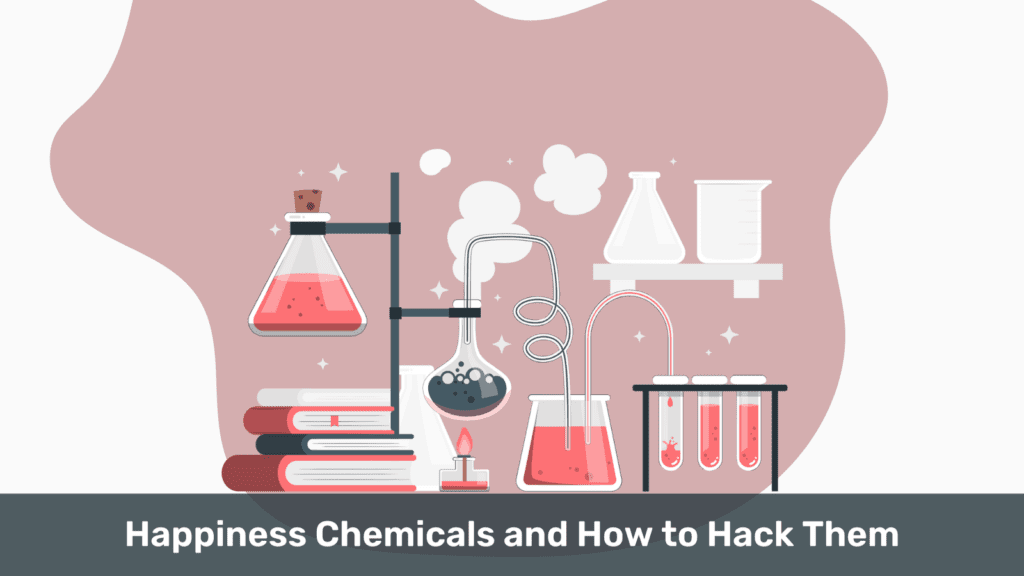Introduction
In the pursuit of happiness, the human brain holds the key to a fascinating realm of chemicals that influence our mood, emotions, and overall well-being. These neurotransmitters, often referred to as “happiness chemicals,” play a crucial role in shaping our experiences and perceptions of joy.
Our brain is a complex chemical laboratory, producing substances known as neurotransmitters that play a crucial role in regulating our emotions. Four primary chemicals—dopamine, serotonin, oxytocin, and endorphins—are often referred to as “happiness chemicals” due to their significant impact on our mood.
The Science Behind Happiness:
Statistics reveal the profound impact these chemicals have on our lives:
-
- According to a study published in the National Institutes of Health, dopamine plays a key role in reinforcing behavior, making it a crucial component in motivation and reward systems.
-
- The World Happiness Report indicates that serotonin levels are closely linked to a country’s overall happiness, with higher levels correlating to greater life satisfaction.
-
- Research published in Psychosomatic Medicine emphasizes the role of oxytocin in reducing stress and promoting social bonding.
-
- Exercise-induced endorphin release is highlighted in a study published in the International Journal of Sports Medicine, showcasing the positive impact of physical activity on mood.
Now, the exciting part—hacking these happiness chemicals to cultivate a more joyful and fulfilling life. Throughout this exploration, we will delve into actionable strategies, lifestyle changes, and mindset shifts that can positively influence the release and balance of these happiness chemicals.
Join us on this enlightening journey as we uncover the secrets of happiness chemicals and learn effective hacks to elevate your mood and overall well-being. Get ready to embark on a path that leads to a happier, more fulfilling life.
4 Hormones of Happiness
The “hormones of happiness” refer to neurotransmitters—chemical messengers in the brain—that play key roles in regulating mood, pleasure, and overall well-being. While technically not all of them are hormones, the term is commonly used to describe these neurotransmitters. The four primary happiness neurotransmitters are dopamine, serotonin, oxytocin, and endorphins.
1. Dopamine: The Reward Molecule
-
- Function: Dopamine is often referred to as the “reward molecule” because it is released during pleasurable situations and reinforces behavior. It plays a crucial role in motivation, goal-directed behavior, and the experience of pleasure.
-
- Effects: Dopamine is associated with feelings of reward and reinforcement. It’s released in response to various stimuli, such as food, sex, and social interactions, and contributes to the sensation of pleasure and satisfaction.
-
- Implications for Well-Being: Balanced dopamine levels are essential for a motivated and reward-driven life. Dysregulation of dopamine is associated with conditions like addiction, attention deficit hyperactivity disorder (ADHD), and Parkinson’s disease.
2. Serotonin: The Mood Stabilizer
-
- Function: Serotonin is often called the “feel-good neurotransmitter” and plays a crucial role in regulating mood, sleep, and appetite. It helps to stabilize emotions and contributes to an overall sense of well-being.
-
- Effects: Adequate serotonin levels are associated with feelings of happiness, contentment, and relaxation. Low serotonin levels have been linked to conditions such as depression, anxiety, and insomnia.
-
- Implications for Well-Being: Maintaining a healthy balance of serotonin is essential for mental health. Lifestyle factors such as exposure to natural light, exercise, and a balanced diet can influence serotonin levels.
3. Oxytocin: The Love Hormone
-
- Function: Oxytocin is often referred to as the “love hormone” or “bonding molecule.” It is released in response to social interactions, particularly those involving trust, intimacy, and positive social experiences.
-
- Effects: Oxytocin promotes feelings of connection, bonding, and trust. It is released during activities such as hugging, cuddling, and socializing, contributing to social bonds.
-
- Implications for Well-Being: Oxytocin is associated with reduced stress levels, improved social interactions, and a sense of emotional well-being. It plays a crucial role in nurturing relationships and fostering social connections.
4. Endorphins: The Natural Painkillers
-
- Function: Endorphins are the body’s natural painkillers. They are released in response to stress and pain and act as mood enhancers and stress relievers.
-
- Effects: Endorphins create a sense of euphoria and block pain signals. They are often released during activities such as exercise, laughter, and certain foods.
-
- Implications for Well-Being: Endorphins contribute to stress relief, pain management, and an overall sense of well-being. Engaging in activities that stimulate endorphin release is beneficial for mental and physical health.
Understanding the functions and effects of these neurotransmitters provides insight into the complex interplay of chemicals that contribute to our emotional experiences and overall happiness.
Happiness Chemicals and How to Hack Them
Hacking into the realm of happiness chemicals involves adopting various lifestyle practices and mindset shifts. By incorporating these hacks into your daily routine, you can positively influence the release and balance of dopamine, serotonin, oxytocin, and endorphins.
Hack 1: Exercise Regularly

Regular physical activity is a potent method to hack into the happiness chemicals, particularly by stimulating the release of endorphins, the body’s natural mood enhancers. Exercise has been shown to have a profound impact on mental well-being, contributing to improved mood, reduced stress, and enhanced overall happiness.
Implementation:
-
- Incorporate exercises that you genuinely enjoy. Whether it’s jogging, cycling, dancing, swimming, or playing a sport, selecting activities you find pleasurable increases the likelihood of sticking to your exercise routine.
-
- Consistency is key. Schedule regular workout sessions as part of your daily or weekly routine. Creating a habit makes it easier to maintain the practice of exercising over the long term.
-
- Whenever possible, choose outdoor activities. Exposure to natural light and the combination of physical activity and nature can amplify the positive effects on mood and well-being.
-
- While intense workouts have their place, consistency is more important. Aim for regular, moderate-intensity exercise that aligns with your fitness level and preferences.
Hack 2: Practice Gratitude

Cultivating a grateful mindset is a powerful hack to boost serotonin levels and contribute to overall feelings of contentment. When you consciously acknowledge and appreciate the positive aspects of your life, you stimulate the release of serotonin, the neurotransmitter associated with mood regulation and well-being.
Implementation
-
- Set aside time each day to write down three things you are grateful for. These can be small moments, achievements, or the presence of positive people in your life. Reflecting on these aspects reinforces a positive outlook.
-
- Take the opportunity to express your gratitude to others. Whether through a heartfelt note, a phone call, or a simple “thank you,” acknowledging and appreciating the kindness of others can enhance your own sense of well-being.
-
- When faced with challenges, consciously shift your perspective to find silver linings. Instead of dwelling on difficulties, consider what lessons or opportunities for growth they might present. This shift in mindset can positively impact your overall mood.
-
- Keep a gratitude jar and regularly add notes detailing moments of gratitude. Over time, the jar becomes a tangible representation of the positive aspects in your life, serving as a visual reminder of the good things you’ve experienced.
Also Read: Gratitude Meditation
Hack 3: Socialize and Connect

Social interactions play a pivotal role in the intricate dance of neurotransmitters, particularly the release of oxytocin. Known as the “love hormone” or “bonding molecule,” oxytocin is stimulated when we engage in positive social experiences, fostering feelings of connection and trust.
Implementation
-
- Dedicate meaningful time to connect with friends and family. Engage in activities that promote shared experiences and strengthen your social bonds.
-
- Physical touch, such as hugs, kisses, or even a friendly pat on the back, can trigger the release of oxytocin. Expressing affection fosters a sense of closeness and connection.
-
- While in-person interactions are valuable, maintaining positive connections through digital means, such as video calls or social media, can also contribute to feelings of connectedness.
-
- Actively listen to others during conversations. Demonstrate empathy and understanding, creating a positive and supportive social environment.
-
- Take the initiative to plan social activities. Organize gatherings or outings that allow for enjoyable and shared experiences with others.
Hack 4: Laugh and Enjoy Humor

Laughter is a powerful tool for hacking into the world of happiness chemicals. When you laugh, your brain releases endorphins, which act as natural mood enhancers. This biochemical response not only induces a sense of joy but also promotes relaxation and stress relief.
Implementation
-
- Incorporate laughter into your daily life by seeking out sources of humor.
- Watch comedy movies, attend live comedy shows, listen to funny podcasts, or spend time with friends and family who have a good sense of humor.
- Embrace the lighter side of life and make room for laughter, recognizing its profound impact on your overall well-being.
Read Further: 30-Day Happiness Challenge
Hack 5: Prioritize Quality Sleep

Quality sleep is a fundamental pillar for overall well-being, influencing various aspects of physical and mental health, including the regulation of serotonin levels—the neurotransmitter associated with mood and happiness.
Implementation
- Establish a Consistent Sleep Routine:
-
- Why: A regular sleep schedule helps regulate your body’s internal clock, promoting better sleep quality over time.
- How: Aim for a consistent bedtime and wake-up time, even on weekends. Create a calming pre-sleep routine to signal to your body that it’s time to wind down.
- Limit Screen Time Before Bed:
-
- Why: The blue light emitted by screens can interfere with the production of melatonin, a hormone that regulates sleep.
- How: Reduce screen time at least an hour before bedtime. Consider using “night mode” settings on electronic devices to minimize blue light exposure.
- Mind Your Diet and Hydration:
-
- Why: Avoid heavy meals, caffeine, and excessive fluids close to bedtime to prevent disruptions to your sleep.
- How: Consume dinner at least a few hours before bedtime, and limit caffeine intake in the afternoon and evening. Stay hydrated but reduce fluid intake closer to bedtime to minimize nighttime trips to the bathroom.
Also Read: 30-Day Water Challenge
- Limit Naps:
-
- Why: While short naps can be beneficial, long or irregular napping during the day may disrupt nighttime sleep.
- How: If you need to nap, keep it short (20-30 minutes) and earlier in the day to avoid interference with nighttime sleep.
Hack 6: Maintain a Balanced Diet

Nutrition plays a crucial role in influencing serotonin levels in the brain. Consuming a well-rounded and balanced diet provides the necessary building blocks for neurotransmitter synthesis, including serotonin.
Implementation
-
- Include Tryptophan-Rich Foods: Tryptophan is an amino acid that serves as a precursor to serotonin. Incorporate tryptophan-rich foods into your diet, such as turkey, chicken, eggs, dairy products, nuts, and seeds.
-
- Omega-3 Fatty Acids: Omega-3 fatty acids, found in fatty fish (e.g., salmon, mackerel), flaxseeds, chia seeds, and walnuts, are associated with improved mood and can positively impact serotonin levels.
-
- Colorful Fruits and Vegetables: Antioxidant-rich fruits and vegetables provide essential vitamins and minerals that support overall brain health. Aim for a diverse range of colorful options to ensure a broad spectrum of nutrients.
-
- Limit Sugar and Processed Foods: Excessive sugar and processed foods can negatively impact mood and energy levels. Opt for whole, unprocessed foods to maintain stable blood sugar levels and support sustained energy.
-
- Hydration is Key: Proper hydration is vital for overall well-being, and dehydration can affect mood and cognitive function. Drink an adequate amount of water throughout the day.
Conclusion
The pursuit of happiness involves understanding and harnessing the power of neurotransmitters known as happiness chemicals. By implementing effective hacks into our lives, we can positively influence the release and balance of dopamine, serotonin, oxytocin, and endorphins, fostering a more joyful and fulfilling existence.
Woliba’s comprehensive platform empowers individuals to take charge of their well-being by providing holistic guidance across these six modules. By incorporating science-backed strategies and personalized recommendations, Woliba becomes a valuable companion on your journey to regulate happiness chemicals, promoting a happier and more fulfilling life.
Contact us now and let the synergy of science, technology, and personalized support elevate your well-being to new heights. Happiness is not just a destination; it’s a journey, and Woliba is here to guide you every step of the way.









